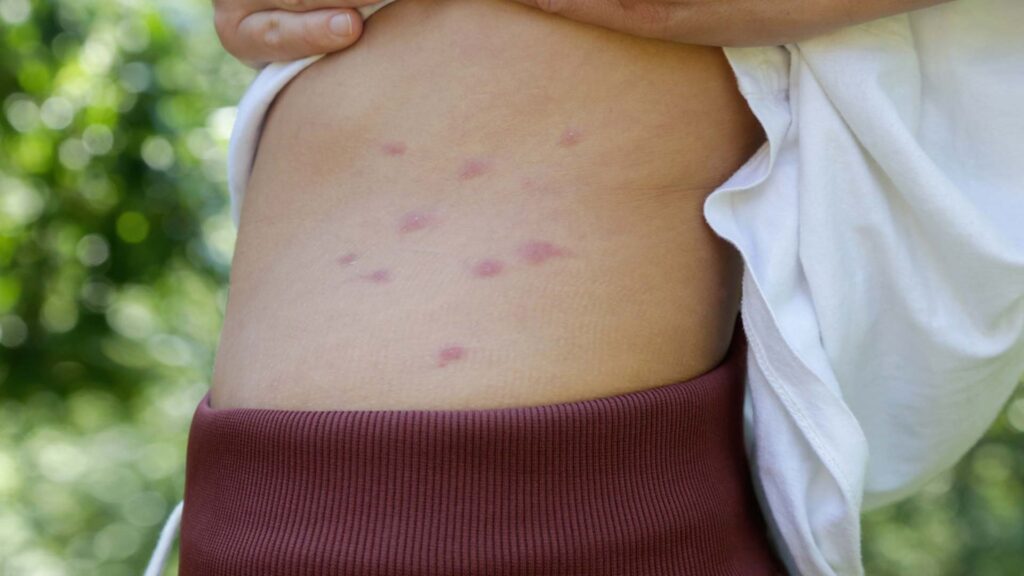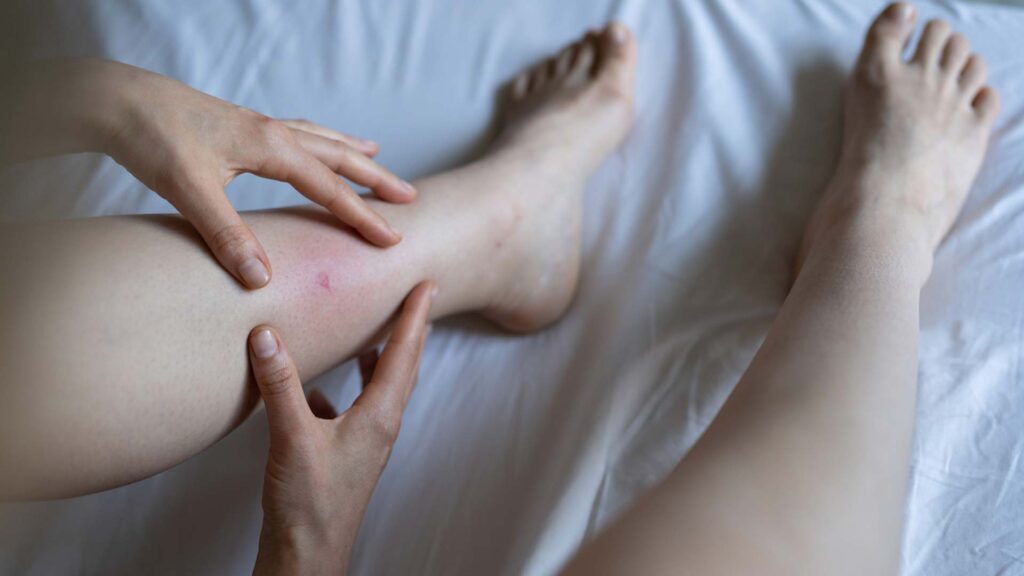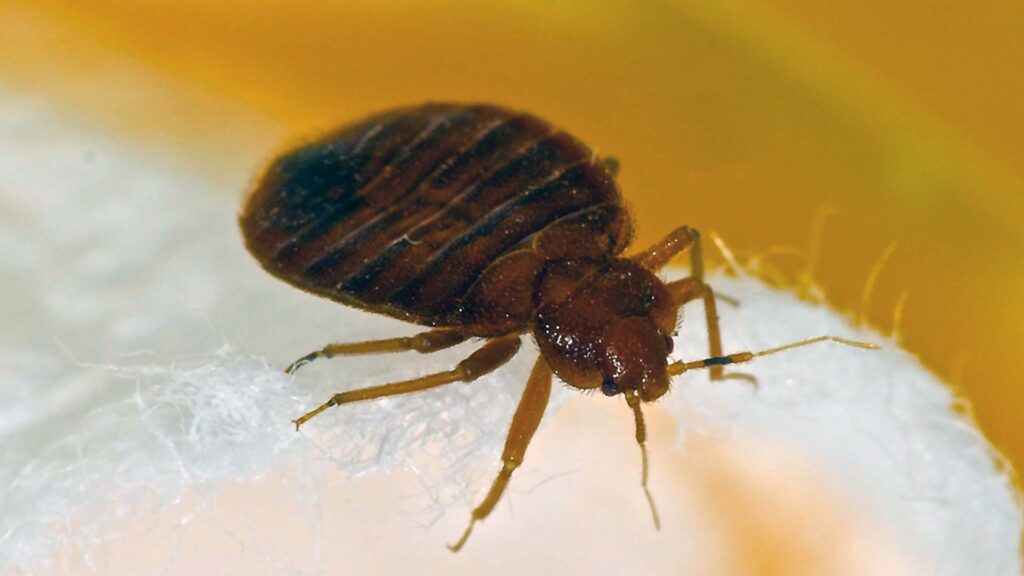Do Bed Bug Bites Itch?
Bed bug bites typically present as small, red, itchy welts, often mistaken for mosquito or flea bites. The itching is an allergic reaction to the saliva injected by bed bugs during feeding. While these bites are not known to transmit diseases, excessive scratching can lead to secondary skin infections. The severity of itchiness can vary from person to person, with some experiencing mild discomfort, while others may have more intense reactions. Awareness and early detection are crucial in managing and preventing bed bug infestations in homes.

In the stillness of our bedrooms, where safety and comfort should be paramount, a tiny, often unnoticed adversary is making its presence increasingly known. Bed bugs, the insidious insects that have coexisted with humans for centuries, are experiencing a disturbing resurgence in homes across the nation. These nocturnal pests, small enough to evade easy detection yet impactful enough to disrupt our peace, have become a significant concern for homeowners, renters, and hoteliers alike.
The primary evidence of their presence, and often the initial alarm bell for many, is the bed bug bite. These bites, frequently appearing in the dead of night, are more than just a nuisance; they are a telltale sign of an infestation that can rapidly spiral out of control. The question on the minds of many who wake to find these itchy, red welts on their skin is simple yet fraught with anxiety: Do bed bug bites itch? The answer is not only key to identifying the problem but also to understanding the broader implications of these unwelcome house guests.
Bed bugs, scientifically known as Cimex lectularius, are not just a problem of cluttered or dirty environments as commonly misconceived. They are opportunistic travelers, hitchhiking on luggage, clothing, and furniture, making no distinction between high-end apartments and modest dwellings. Their resurgence is partly attributed to increased global travel and urbanization, coupled with their growing resistance to traditional pesticides.
The concern surrounding bed bug bites extends beyond the physical discomfort they cause. These bites can have varied effects on individuals, ranging from no reaction at all to severe allergic responses. The psychological impact, too, cannot be understated. The knowledge of sharing one’s bed with these pests can lead to anxiety, stress, and sleepless nights, turning the sanctuary of one’s bedroom into a source of dread.
As we delve deeper into the world of bed bugs, it becomes clear that understanding and addressing their bites is just the first step in a larger battle. It’s a battle that calls for awareness, vigilance, and a proactive approach to safeguard our homes, our health, and our peace of mind from these hidden invaders.
Biology of the Bite
| Stage | Description | Physical Reaction | Psychological Impact | Management Strategies |
|---|---|---|---|---|
| Initial Bite | Bed bug injects saliva containing allergens. | Skin begins to react; initial itching starts. | Minimal; may be unaware of the bite. | Clean the area; apply a cold compress to reduce initial swelling. |
| Immune Response | Body recognizes foreign proteins, releasing histamines. | Increased itching, redness, and swelling at the bite site. | Growing awareness and discomfort; sleep may be disturbed. | Use topical antihistamines or corticosteroids to alleviate itching. |
| Itch-Scratch Cycle | Persistent itching leads to scratching, which aggravates the skin. | Potential skin breakdown; risk of secondary infection increases. | Increased stress and anxiety; possible sleep loss and irritability. | Keep nails short; cover the area to prevent scratching; consider oral antihistamines. |
| Secondary Infection | Broken skin becomes infected. | Signs of infection (redness, pus, swelling); itching may worsen. | Heightened anxiety; concern over health complications. | Seek medical attention; antibiotics may be required for infection. |
| Resolution | Bed bug infestation is addressed; no new bites occur. | Gradual healing of bites; reduction in itching and inflammation. | Relief and improved mental well-being; restoration of normal sleep patterns. | Maintain vigilance for bed bugs; continue skin care to aid healing. |
The biology of a bed bug bite is a fascinating yet unsettling topic, particularly when considering the intricacies of how these tiny creatures feed on human blood. To fully grasp the impact of these bites, it’s essential to delve into the bed bug’s feeding mechanism, the composition of their saliva, and the subsequent reaction it triggers in human skin.
Bed bugs are equipped with a specialized mouthpart known as a proboscis, which they use to pierce the skin and access a blood vessel. This process is often undetected at the moment of the bite due to the bed bug’s stealthy approach and the anesthetic compounds in their saliva. The feeding process can last anywhere from a few minutes to more than 10 minutes, depending on various factors including the bed bug’s age and hunger level.
The saliva of bed bugs is a complex cocktail of various substances, each serving a specific purpose. The most notable are the anticoagulants and anesthetics. Anticoagulants ensure that the blood remains fluid enough for easy ingestion, while the anesthetics prevent the host from feeling the bite, allowing the bed bug to feed undisturbed. Additionally, the saliva contains enzymes and proteins that can trigger allergic reactions in humans.
When a bed bug bites, it injects its saliva into the skin. The human immune system recognizes the foreign proteins in the saliva as invaders, triggering an allergic reaction. This reaction typically involves the release of histamine, a compound that causes inflammation and swelling in the affected area. The degree of this reaction varies widely among individuals, with some showing hardly any signs, while others develop pronounced welts and intense itching.
An intriguing aspect of the biology of bed bug bites is the phenomenon of sensitization. With repeated exposure to bed bug bites, some individuals may become increasingly sensitive to the proteins in the saliva. This means that over time, the allergic reactions can become more severe, leading to more pronounced and uncomfortable symptoms with each subsequent bite.
It’s also important to note that reactions to bed bug bites can be delayed. In some cases, the welts and itching may not appear until several days after the bite. This delay can make identifying the source of the bites challenging and can contribute to the difficulty in detecting and managing bed bug infestations early.
The biology of a bed bug bite is a complex process involving the bed bug’s specialized feeding mechanism, the unique composition of its saliva, and the human body’s reaction to foreign substances. Understanding this process is crucial not only for identifying and treating bed bug bites but also for appreciating the importance of early detection and control of bed bug infestations in the home.
The Itch Factor
What Causes the Itch?
Bed bug bites itch due to an allergic reaction to the bug’s saliva.
The severity of itching varies from person to person.
Some may have a mild reaction, while others experience intense itching.
Identifying Bed Bug Bites
Appear as small, red, raised welts.
Often occur in a line or cluster.
Commonly found on exposed areas like arms, legs, and face.
Managing the Itch
Avoid scratching to prevent infection.
Over-the-counter antihistamines and corticosteroid creams can alleviate itching.
Cool compresses may provide temporary relief.
When it comes to bed bug bites, the most immediate and noticeable symptom for many is the itch. This seemingly minor annoyance can actually be quite significant, affecting sleep quality, daily comfort, and even mental well-being. Understanding the itch factor in bed bug bites involves delving into the biology of bed bugs, the body’s reaction to their bites, and the variability of these reactions among different individuals.
Not everyone reacts to bed bug bites in the same way. Some individuals may have a mild reaction with minimal itching, while others may experience severe itching and prominent welts. “The severity of the itch depends on an individual’s immune response to the bed bug’s saliva,” says Dr. Richards. “Repeated exposure can sometimes lead to sensitization, where the reactions become more severe over time.”
The constant itch can have a profound psychological impact. Victims of bed bug infestations often report increased stress and anxiety, sleep disturbances, and even symptoms of depression. The persistent itch and the knowledge of an infestation can lead to a condition known as delusory parasitosis, where individuals feel as though bugs are crawling on or biting them, even when they are not.
While bed bug bites themselves are not dangerous, the itch can lead to secondary skin infections if the skin is broken from scratching. Additionally, the psychological toll of dealing with an infestation and its itchy aftermath should not be underestimated.
The itch factor in bed bug bites is more than a mere nuisance. It’s a complex interplay of biological reactions and psychological effects. Understanding this aspect of bed bug bites is crucial for homeowners, not only for managing the symptoms but also for recognizing the importance of prompt and effective pest control measures.
The Cycle of Itching
The cycle of itching associated with bed bug bites is a complex and often distressing experience for those affected. This cycle not only involves the physical sensation of itching but also encompasses the body’s reaction to the bites, the psychological effects of dealing with an infestation, and the potential for escalating skin issues.
When a bed bug bites, it injects saliva into the skin, which contains anticoagulants and proteins that most people are allergic to. This triggers an immune response, leading to inflammation and the release of histamines, which cause the skin to itch. Dr. Rebecca Hart, an allergist, explains, “The itching is your body’s defense mechanism against the foreign substance. The release of histamines is intended to protect the body, but it also causes the redness, swelling, and itching associated with bed bug bites.”
One of the most challenging aspects of bed bug bites is the itch-scratch cycle. The intense itching leads to scratching, which can break the skin and lead to further irritation or infection. “Scratching exacerbates the problem,” says Dr. Hart. “It can intensify the itching and even lead to chronic skin conditions if the cycle continues.”
The duration and intensity of itching can vary widely. Some individuals may find the itching subsides relatively quickly, while others experience prolonged and intense discomfort. Factors such as the number of bites, the individual’s sensitivity to the bites, and the presence of secondary infections can all influence the duration and severity of the itch.
The psychological impact of the itch-scratch cycle can be significant. The constant irritation can lead to sleep disturbances, anxiety, and even symptoms of depression, particularly in cases of severe or prolonged infestations. The knowledge that one’s living space is infested with bed bugs can exacerbate these psychological effects.
Managing the itch involves both treating the symptoms and addressing the underlying cause – the bed bug infestation. Topical treatments such as antihistamine creams or corticosteroids can help alleviate the itching. Oral antihistamines can also be effective. However, Dr. Hart emphasizes, “While these treatments can provide relief, they are not a solution to the problem. Professional extermination and preventive measures are necessary to stop the cycle.”
One of the risks of the itch-scratch cycle is the development of secondary skin infections. Broken skin can become infected, leading to more serious health issues. Keeping the affected area clean and avoiding scratching are crucial steps in preventing infection.
The cycle of itching from bed bug bites is a multifaceted issue that extends beyond mere physical discomfort. It involves a complex interplay of biological reactions, psychological effects, and potential complications. Understanding this cycle is essential for those dealing with bed bug infestations, as it underscores the importance of prompt and effective treatment of both the symptoms and the infestation itself.
Managing the Itch
Managing the itch caused by bed bug bites is a crucial aspect of dealing with an infestation. This itch, while not life-threatening, can significantly impact a person’s quality of life. Effective management involves both treating the symptoms and addressing the root cause – the bed bug infestation itself.
The first step in managing the itch is to alleviate the symptoms. Dr. Laura Benson, a dermatologist, recommends, “Applying a corticosteroid cream to the bites can reduce inflammation and itching.” These creams are available over the counter and are effective for mild reactions. For more severe itching, oral antihistamines can provide relief.
One of the risks of itchy bed bug bites is the potential for secondary infection caused by scratching. “It’s crucial to keep the area clean and avoid scratching,” advises Dr. Benson. “If the skin is broken, apply an antiseptic to reduce the risk of infection.” Keeping fingernails short and clean can also help minimize damage from scratching.
In addition to medical treatments, there are several home remedies that can provide relief. Cool compresses or a bath with colloidal oatmeal can soothe the skin. Aloe vera, known for its anti-inflammatory properties, can be applied to the bites to reduce itching and swelling.
While treating the itch is important, it’s equally crucial to address the bed bug infestation. “No treatment for the bites will be effective in the long term if the bed bugs are not eradicated,” states Dr. Benson. Professional pest control services are often necessary to fully eliminate an infestation.
Preventing future bites is key to managing the itch over the long term. This involves inspecting and cleaning bedding and furniture regularly, being vigilant during travel, and using protective covers on mattresses and pillows.
The psychological impact of bed bug bites and the associated itch should not be underestimated. In cases where anxiety or sleep disturbances occur, seeking support from a mental health professional can be beneficial. Cognitive-behavioral therapy and stress management techniques can help individuals cope with the psychological effects of an infestation.
Managing the itch from bed bug bites requires a multifaceted approach that includes both symptom relief and addressing the infestation. Combining medical treatments, home remedies, preventive measures, and psychological support can effectively reduce discomfort and prevent future issues. It’s a comprehensive strategy that not only soothes the physical symptoms but also addresses the underlying cause and its emotional impact.
Health Implications
The health implications of bed bug bites, though often considered minor, can extend beyond the immediate discomfort of itching. Dr. Emily Grant, a dermatologist with a focus on insect bites, emphasizes the psychological impact: “Patients with bed bug infestations frequently report sleep disturbances, anxiety, and even symptoms of post-traumatic stress disorder (PTSD).” The persistent worry about being bitten can disrupt sleep patterns, leading to insomnia and heightened stress levels. This psychological toll is a crucial, yet frequently overlooked, aspect of bed bug infestations.
Furthermore, the physical reactions to bed bug bites can vary widely among individuals. While some may experience mild itching, others may develop severe allergic reactions. “In extreme cases, individuals can exhibit anaphylactic responses to the bites, necessitating immediate medical attention,” Dr. Grant adds. Additionally, excessive scratching can lead to secondary skin infections such as impetigo, cellulitis, and lymphangitis. These infections, if left untreated, can pose serious health risks, particularly in individuals with weakened immune systems or pre-existing skin conditions.
The health implications of bed bug bites are multifaceted, encompassing both physical and psychological dimensions. While not inherently dangerous, the bites can lead to a range of complications, underscoring the need for prompt and effective management of bed bug infestations.
Prevention and Management
Preventing bed bug infestations requires a multifaceted approach. Homeowners should be vigilant, especially when purchasing second-hand furniture or returning from travel. Inspecting luggage and clothing for signs of bed bugs can prevent them from entering homes. Encasing mattresses and box springs in protective covers is another effective strategy, as it limits hiding spots for these pests. Regular cleaning, including vacuuming of mattresses, bed frames, and surrounding areas, can also help detect and remove early signs of infestation.
When it comes to managing an existing infestation, professional extermination is often the most reliable solution. Pest control professionals use a combination of techniques, including heat treatment, freezing, and pesticides specifically designed to target bed bugs. Homeowners should be wary of over-the-counter sprays and DIY methods, as these can sometimes exacerbate the problem by causing bed bugs to spread to other areas. Continuous monitoring and follow-up treatments are crucial, as bed bugs are known for their resilience and ability to survive even after initial extermination efforts.
In addition to these measures, educating oneself about bed bug behavior and signs of infestation is vital. Understanding their feeding patterns, typical hiding places, and life cycle can aid in early detection and effective management. Community awareness programs and resources provided by local health departments can also be valuable in staying informed and prepared to tackle bed bug issues effectively.
Navigating the Challenge of Bed Bug Infestations
In New York, Emily Rodriguez, a mother of two, talks about how her family’s encounter with bed bugs turned their home into a battleground. “My kids were waking up with bites every morning. We tried everything – washing everything in hot water, vacuuming incessantly, even homemade remedies. Nothing worked,” she shares. The situation became so dire that they eventually had to vacate their apartment for extensive treatment. “It was a disruptive and costly experience, but the well-being of my family was my top priority,” Emily states. Her story underscores the emotional and financial strain bed bug infestations can impose on households, highlighting the need for effective, long-term solutions.
The resurgence of bed bugs in homes across the nation is more than a mere nuisance; it’s a multifaceted issue that intertwines public health, home safety, and personal well-being. As these tiny pests continue their silent invasion into our bedrooms and living spaces, the importance of awareness, prevention, and effective response cannot be overstated.
Knowledge is the first line of defense in the battle against bed bugs. Homeowners need to be aware of the signs of an infestation, which often manifest as itchy bites in a line or cluster, and dark spotting on bedding from bug excrement. Understanding that bed bugs are not a sign of poor hygiene but can thrive in any environment is crucial. They hitchhike on luggage, clothing, and furniture, making anyone susceptible to an infestation.
Prevention is always better than cure. Regular inspection of mattresses, bed frames, and furniture can help in early detection. Using protective covers on mattresses and pillows can also reduce the risk of an infestation. When traveling, it’s advisable to inspect hotel rooms and keep luggage away from beds and walls. Upon returning home, washing and drying clothes on high heat can eliminate any hitchhiking bed bugs.
When an infestation is detected, prompt action is essential. While there are numerous DIY methods available, most are ineffective against a full-blown infestation. Professional pest control services offer more reliable solutions. These experts use a combination of chemical and non-chemical treatments tailored to the specific situation, ensuring a thorough eradication of the pests.
The presence of bed bugs can have a significant psychological impact on individuals, often leading to anxiety, stress, and sleep disturbances. It’s important for those affected to understand that seeking help is not a sign of weakness. Consulting with mental health professionals can be as crucial as addressing the physical infestation.
Bed bug infestations are not just an individual problem but a community concern. Sharing information and resources within communities can help in early detection and prevention. Landlords, tenants, and neighbors should work collaboratively to address and prevent infestations.
As bed bugs continue to evolve and adapt, research into more effective control methods is ongoing. Scientists are exploring new technologies and approaches, including genetic studies and the development of more effective pesticides.
The challenge posed by bed bugs is significant, but not insurmountable. Through a combination of awareness, preventive measures, professional intervention, and community efforts, we can protect our homes and families from these unwelcome invaders. As we continue to advance in our understanding and resources, there is hope for more effective and lasting solutions in the battle against bed bugs.
Frequently Asked Questions About Bed Bug Bites
Why do bed bug bites itch?
Bed bug bites itch due to an allergic reaction to the bug’s saliva, which is injected into the skin during feeding. This reaction varies from person to person, ranging from mild to severe itching.
Can everyone have an allergic reaction to bed bug bites?
Yes, anyone can have an allergic reaction to bed bug bites. However, the severity of the reaction varies. Some individuals may experience intense itching and swelling, while others might not notice any symptoms.
How long do bed bug bites take to start itching?
The itching from bed bug bites can start immediately or may take a few days to appear, depending on the individual’s sensitivity to the bites.
Are bed bug bites dangerous?
Bed bug bites themselves are not dangerous and do not transmit diseases. However, excessive scratching can lead to secondary skin infections, which may require medical attention.
How can I tell if a bite is from a bed bug?
Bed bug bites often appear as small, red, itchy welts, typically in a line or cluster. They are commonly found on exposed areas of the body, such as the arms, legs, and face.
What should I do if I suspect bed bug bites?
If you suspect bed bug bites, inspect your sleeping area for signs of bed bugs, such as small brown bugs or tiny blood spots on bedding. Consider consulting a pest control professional for confirmation and treatment.
How can I relieve the itching from bed bug bites?
Over-the-counter anti-itch creams or antihistamines can help relieve itching. Avoid scratching the bites to prevent infection.
Can bed bug bites spread if scratched?
Scratching bed bug bites does not cause them to spread, but it can increase the risk of a secondary skin infection.
How can I prevent bed bug bites?
Preventing bed bug bites involves avoiding infestations. Regularly inspect your sleeping area, especially after traveling, and consider using protective covers on mattresses and pillows.
Are there any long-term effects of bed bug bites?
There are typically no long-term effects from bed bug bites. Once the bites are healed and the infestation is eradicated, symptoms should not persist.




